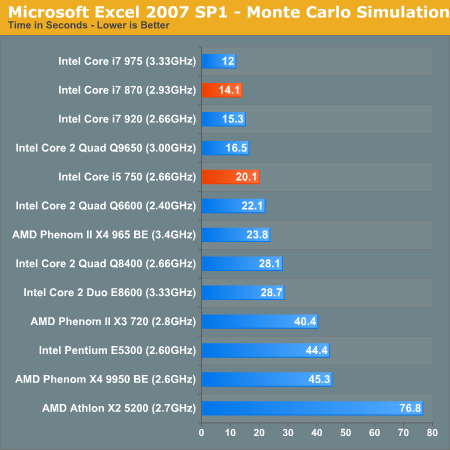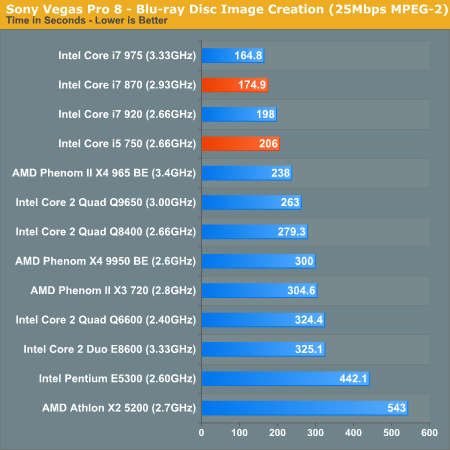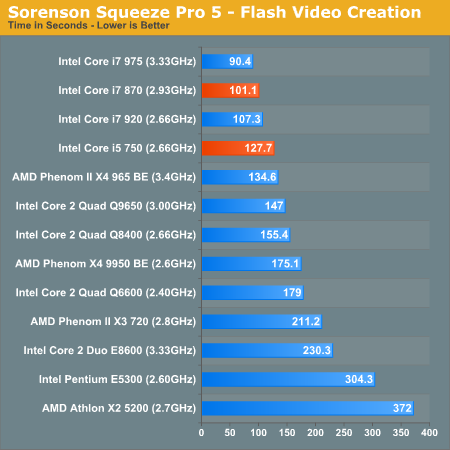Intel's Core i7 870 & i5 750, Lynnfield: Harder, Better, Faster Stronger
by Anand Lal Shimpi on September 8, 2009 12:00 AM EST- Posted in
- CPUs
Microsoft Excel 2007
Excel can be a very powerful mathematical tool. In this benchmark we're running a Monte Carlo simulation on a very large spreadsheet of stock pricing data.

The Excel test is peculiar in its results. It must be one of the few situations where Bloomfield's memory bandwidth advantage is seen as even the Core i7 870 can't outperform the i7 920. The Core 2 Quad Q9650 does well thanks to its large 12MB L2 cache, as does the Q6600 with a beefy 8MB cache.
Sony Vegas Pro 8: Blu-ray Disc Creation
Although technically a test simulating the creation of a Blu-ray disc, the majority of the time in our Sony Vegas Pro benchmark is spend encoding the 25Mbps MPEG-2 video stream and not actually creating the Blu-ray disc itself.

Hyper Threading is good for about 4% here, giving the 920 the slight edge over the Core i5 750.
Sorenson Squeeze: FLV Creation
Another video related benchmark, we're using Sorenson Squeeze to convert regular videos into Flash videos for use on websites.

The i5 750 pays the HT penalty, taking another 20 seconds to render our test video than the i7 920. It is still faster than the Phenom II X4 965 BE at a much lower cost. The Core i7 870 comes close but can't beat the i7 975.










343 Comments
View All Comments
tajmahal - Tuesday, September 8, 2009 - link
You fail to mention that Microcenter prices are for IN STORE PURCHASE ONLY. If you live about 6 driving hours away from a Microcenter like i do, then you're screwed.Chlorus - Tuesday, September 8, 2009 - link
Shhh! Don't spoil his self-righteous post with your troublesome facts!strikeback03 - Tuesday, September 8, 2009 - link
Does Microcenter have a limit on how many processors people can buy? If not, why isn't anyone buying these things and reselling them for less than the ~$280 that Newegg (and every other online retailer) do?Solema - Tuesday, September 8, 2009 - link
Anand,I know those prices you quoted are per-unit prices from Intel, but they are much more expensive than actual CPU costs. Given that I can get the following from Micro Center, and that I plan to overclock and run two 8800GTS 512's in SLI, what would you recommend?
i5 750 - $179
i7 920 - $199
i7 860 - $229
It still seems to me that the additional overclocking flexibility of the 920 (especially on stock voltage), coupled with the better multi-GPU performance would make that the best CPU to purchase, no? Given that P55 motherboards currently only retail for about $50 cheaper than many x58 boards, wouldn't the extra $70 cost for x58+i7 920 over a P55+i5 750 be worth it? You get better multi-GPU performance, better overclocking, better RAM performance, and future upgradeability to 6-core CPU's. What am I missing that would tip the scales in favor of the i5?
Pneumothorax - Tuesday, September 8, 2009 - link
the 920 for sure as you get a HT CPU for even cheaper than the 860. Both should overclock the same.dman - Tuesday, September 8, 2009 - link
So, do they support Hardware Virtualization? And don't give slack about not targeted at that market, specifically, does this support Windows 7 virtualization mode?I searched and didn't see it covered. I've read that the i5 and lower do not support vt-d, but, I'm not sure how that translates to Windows 7 "XP mode" support... I do need to review a bit more, would be nice if this was covered in the review.
I do know that this IS something that the Phenom family does support.
http://www.virtualization.info/2009/07/intel-core-...">http://www.virtualization.info/2009/07/...core-i3-...
ash9 - Tuesday, September 8, 2009 - link
No Virtalization!! That maybe huge for corporate setups,how did I miss that.
It should have been reported
has407 - Wednesday, September 9, 2009 - link
VT-x != VT-d. You want, and may need, VT-x. Most people don't need VT-d, much less know what to do with it or have a system that can make use of it--if you do, you're very unlikely to be using one of these CPUs.VT-x is Intel's name for processor virtualization features; it is part of the processor. All Core iX CPUs support it. VT-x is required for some hypervisors, (e.g., MSFT HYperV), but not all, although most (all?) require it for running 64-bit guests.
VT-d is Intels name for for IO virtualization (specifically "directed IO"); it is, or has been, part of the northbridge. For VT-d to be useful, you need a chipset that supports it; a MB/BIOS that supports it; and a hypervisor that knows how to use it. VT-d is primarily of interest to VM's that want to dedicate direct access to hardware by guests, and avoid the overhead of the hypervisor for that IO.
When you see "CPU X supports vT-d", it means the chipset for CPU X supports VT-d (the P55 supports VT-d). Whether MB/BIOS vendors choose to support it is another matter. Moreover, support for VT-d isn't simply yes or no; support varies by chipset (e.g., the P55, like the rest, support virtualizating a subset of interfaces).
In short:
1. Based on Core iX chipset capabilities (e.g., P55, X58), VT-d support is an MB vendor decision--not a function of the CPU model.
2. Which vendors support VT-d, and to what extent, is more often than not clear as mud, and the topic of much discussion in some threads.
3. If VT-d is important to you, you're probably running a heavy virtualized workload on an MP system with 10Gbe or very fast DAS--certainly not a Core iX. (Only exception of interest to others might be for access to GPU's by VMs)
What the new processors throw into the mix is an integrated PCIe controller, which also means an integrated DMA controller (at least I hope it does). Whether that supports VT-d is unknown (I haven't been able to find a definitive answer).
Gary Key - Tuesday, September 8, 2009 - link
VT-d is enabled on the i7/870-860. It is not enabled on the i5/750, just VT-x is available on it. I am working on Windows 7 XP mode as we speak.Jakall78 - Tuesday, September 8, 2009 - link
Reading this site for years, but there is something wrong going on here. Besides some slideshow pictures from Intel and 2-3 tests... there is nothing. That is not the way reviews are done. Look at the SSD reviews, THAT is a review(both of them actually). Now please look at this reviewhttp://translate.google.com/translate?prev=hp&...">http://translate.google.com/translate?p...mp;sl=ro...
and say it`s not better...
* I`m not making any false advertising here, I just found a better review.